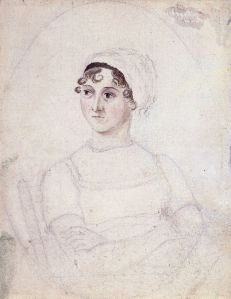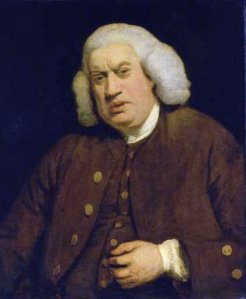
After Jonathan Swift gave up on an Academy for the English language, Samuel Johnson (often known as Dr Johnson) came to the rescue. Dr Johnson was a famous, and enormously influential, eighteenth century writer, generally considered the first real critic of literature, and the subject of the most famous biography of all time: James Boswell’s Life of Samuel Johnson.
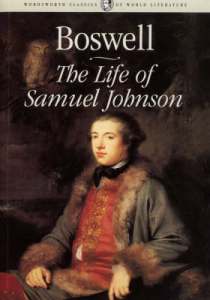
Johnson spent about seven years writing a dictionary that was published in 1755. It is read today more as an entertainment than as a reference book but it was very popular at the time. Johnson believed that common words should be avoided; heroic thoughts came from heroic words. He was unhappy that Shakespeare had used ordinary words like knife! Many people in the eighteenth century believed that unruly common words helped Revolution and chaos to enter society (particularly from Revolutionary France). Johnson originally hoped, like Swift, to fix this heroic, ordered English language for all time; he eventually gave up on this impossible task.
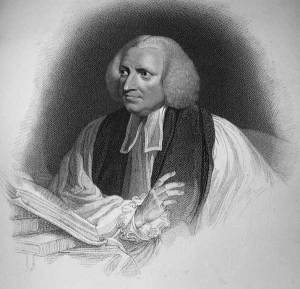
The first serious English grammarians also emerged in the eighteenth century. The Professor of Poetry at Oxford University, Robert Lowth, published one of the most influential grammar textbooks in 1762. The new rules of grammar made things clearer in some cases but were sometimes meaningless. Lowth tried to ban certain words that he did not like, such as fib, fop, banter, bigot, flippant, flimsy, and nowadays. Clearly, it is impossible to control the language in this way.
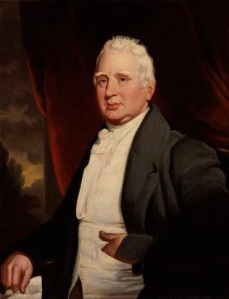
Even so, there was tremendous interest in knowing how to speak and write good English. The famous pamphleteer, William Cobbett argued it was impossible to advance in modern society without knowledge of the rules of grammar. The growing middle class in eighteenth century England wanted to be educated; to meet this demand, Thomas Sheridan, an actor, became a teacher of elocution. Sheridan believed that there was only one way to speak proper English and he published a book on proper pronunciation, British Education, in 1756. He toured England and later Scotland, lecturing to famous Scottish Enlightenment figures such as Adam Smith and David Hume. Many people believed that it was important to speak properly if you wanted to be fashionable.
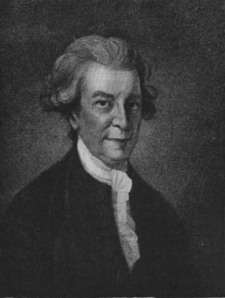
However, many people thought that this belief in only one way of speaking was nonsense. In particular, many Scottish people did not want to copy others; they pointed to their own great poet Robert Burns as a better model for writing and speaking. The philosopher Thomas Paine, influential at the time of the French Revolution, wrote in a simple, clear, and natural style. The English poet William Wordsworth, also sympathetic to the Revolution at first, argued that a more natural form of expression was better for poetry. These revolutionaries believed that real feeling and important ideas could only be expressed in simple language. Thomas Sheridan’s son, Richard Sheridan, wrote a play, The Rivals, which made fun of a character who tries too hard to use long, heroic-sounding words; this was the famous Mrs Malaprop.

While Mrs. Malaprop was mocked, women were becoming better educated and many were ferocious readers of novels. Jane Austen, the great English novelist, perhaps did more than any other person to form the English language, either at the beginning of the nineteenth century or at any time. Her novels appeared after the French Revolution, when Napoleon’s France was threatening to bring social upheaval to England. It was a time when people wanted a reassuring sense of order and calm. Austen defined English social acceptability, using words like agreeable, appropriate, delicacy, discretion, eligible, order, propriety, respectable, and unfit. Austen follows Johnson in avoiding common, unruly words but her realism was powerfully influential on later novelists such as the Bronte sisters, who were born around the time Austen died.
